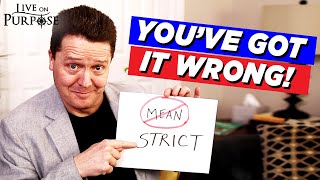As parents, we constantly wonder if we're on track or not. In parenting, how strict is too strict? To answer this question. we've got to get into the motivation. That determines whether it's too strict or not.
Before we dive too much into that, let's get a little bit more of a definition. Strict I think means being able to enforce appropriate limits and rules effectively without giving in or being inconsistent. This is how I'm defining it. Strict is not mean.
To be a strict parent is not a bad thing. To be a mean parent, we got a problem. So, strict is not mean. Keep that in mind as we talk about this.
It's still a legitimate question. How strict is too strict? Where are you coming from as a parent? What is your motivation? What is your job as a parent? It's so fun for me when I get on discovery calls or in our Positive Parenting Coaching groups, I ask people, “What is your job as a parent?” They always know. If they've been watching me on YouTube. If you haven’t seen me there, here's the answer: To love them no matter what and even if.
Now, if we play the even if game, “Even if they hate you?” Yes. Even if they hate you. “Even if they don't do what you ask them to?” Uh-huh, yeah. Have you tried that one? Every parent gets tested on that one. “Even if they get strung out on drugs or get thrown in prison or become a menace to society?” Yes. Even if all of that terrible stuff happens. Your job is to love them no matter what even if.
Are we clear?
That's important because we go back to the question. How strict is too strict? I tell you what. If you think your job is to make sure that they anything, then you are at a high risk for being too strict as a parent. That motivation will have you jumping in and intervening and meddling and micromanaging to a point that is going to drive your kids crazy and it's going to frustrate you as well.
We can look for our motivation through three important feelings. These are indicator feelings. Frustration, anger, and resentment. If you as a parent are feeling a lot of frustration, anger and resentment, it's probably because we got the control and maturity out of whack. It also means that you are at risk for being too strict. Or, for being too lenient.
What if you think your job is to make sure that they are happy? They are going to throw all kinds of opportunities at you arguing, “This is what will make me happy mom. Dad, this is all I ever wanted.” You will cave in and indulge them in whatever their desires are because you think your job is to make sure that they are happy.
Your job is not to make sure that they anything. Still love them no matter what even if. And that's going to help us to regulate the right amount of strictness.
There are two things that give you authority as a parent. You've got to have both in order to have authority. If you are missing one or the other, you won't have the authority that you need or the respect of your children.
First, you have to be able to set and enforce appropriate limits. Strictness has to do with setting and enforcing appropriate limits. Remember, it's not being mean.
Secondly, you need to have authority with your kids to be seen as a provider of good times and good things. You have to be able to provide some positives and some fun and to lighten up from time to time. If we are not having fun, we are doing it wrong. Both of those are required to have authority. To be able to set and enforce appropriate limits and to be seen as a provider of good times and good things. If you are not up to speed on either of those, you are probably at risk for being too strict or too lax.
So, what is an ideal level of strictness? I think the ideally strict parent would have a calm and pleasant demeanor as they are able to set and enforce appropriate limits. Follow through with consequences with consistency and focus on the relationship with their child as being the most important element of this whole equation.
The relationship is what will give you the opportunity to influence your children for the long term. Even after they have grown up and they are living a life of their own. We don't want to sacrifice the important elements of that relationship for some selfish desire to make sure that they whatever. That relationship is the most important. And it's more important than the structure of the discipline. You just keep it straight in your mind about which one's more important.
Well, you've probably figured it out by now that parenting is more of an art than a science. And there's some predictable principles we can apply. It's going to take some practice too. And probably a community of other positive parents like you.
We are creating a community of positive people at Live On Purpose TV on YouTube. Join us there and invite someone else in. Let's increase the community of positive conscious parents that we have in our world.
